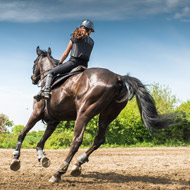BHA reports outbreak of equine herpesvirus

Equine herpes virus is a common infection that affects horse populations across the world.
An outbreak of equine herpesvirus 1 has been confirmed at a training yard in Yorkshire.
According to the British Horseracing Authority (BHA), only one horse is thought to be affected. The organisation is now working with the yard owner, Kevin Ryan, his staff and veterinary surgeon to ensure that correct control measures are in place.
“Cases of the neurological form of EHV-1 are occasional and, while the disease can be extremely serious for the affected horses, with proper surveillance and disease control the virus can usually be effectively contained,” commented David Sykes, director of equine health and welfare for the BHA.
“While the risk of the virus being transmitted in a controlled race day environment is relatively small, it is, in theory, possible that horses from the yard in question may have been infectious some time before the disease was diagnosed. For this reason, we have taken measures to alert trainers, as well as racecourses and veterinary surgeons, to be vigilant to the clinical signs.”
The measures put in place by the BHA include further testing, increased biosecurity and a temporary quarantine stop. The stop will prevent Mr Ryan from making declarations for races in the UK until further notice.
As a precautionary measure, two further yards have also been quarantined due to their close proximity and the sharing of horse boxes. The BHA states that these measures have been taken as a precaution, ‘with the safety of the horse population very much in mind.’
Equine herpesvirus is a common infection that affects horse populations across the world. The two most common strains - EHV-1 and EHV-4 - can cause respiratory disease, especially in young horses. They will also cause abortion in broodmares and EHV-1 can also lead to un-coordination, paralysis and death.



 The RCVS has announced a new version of its 1CPD mobile app, with enhanced features for veterinary surgeons and veterinary nurses to record their continuing professional development.
The RCVS has announced a new version of its 1CPD mobile app, with enhanced features for veterinary surgeons and veterinary nurses to record their continuing professional development.